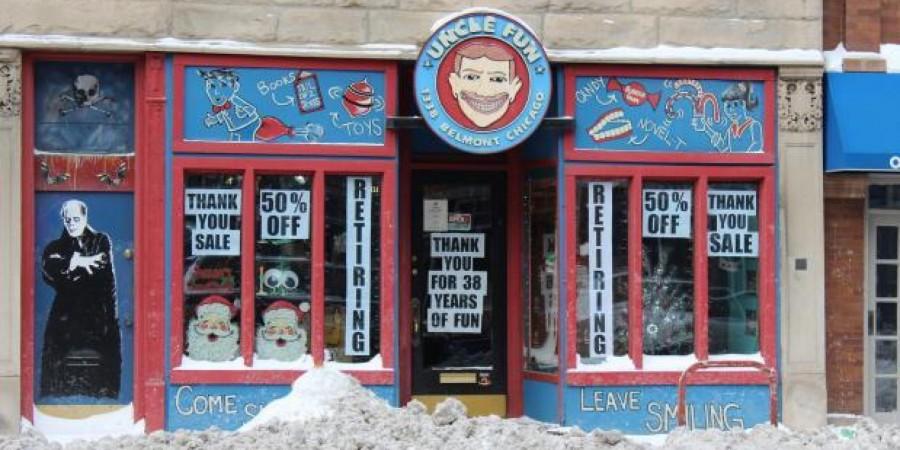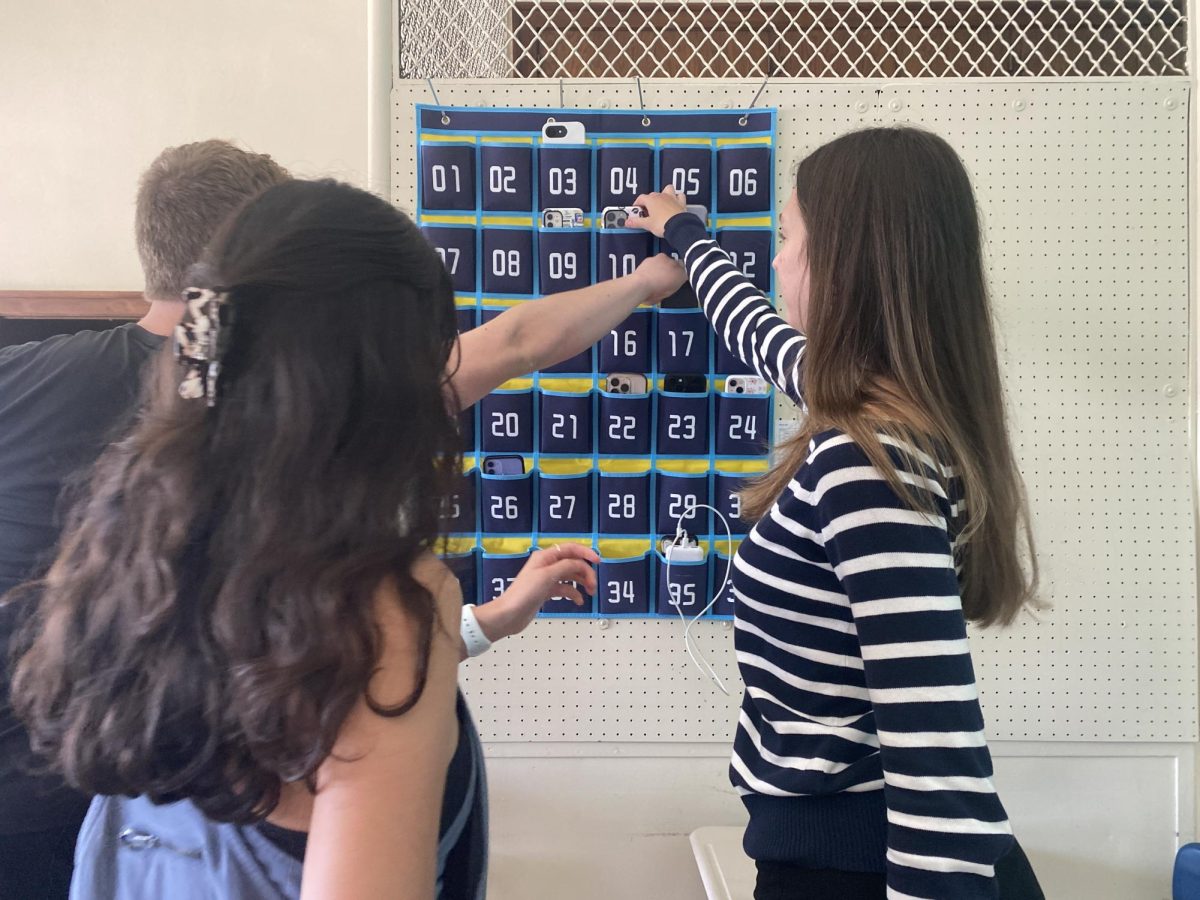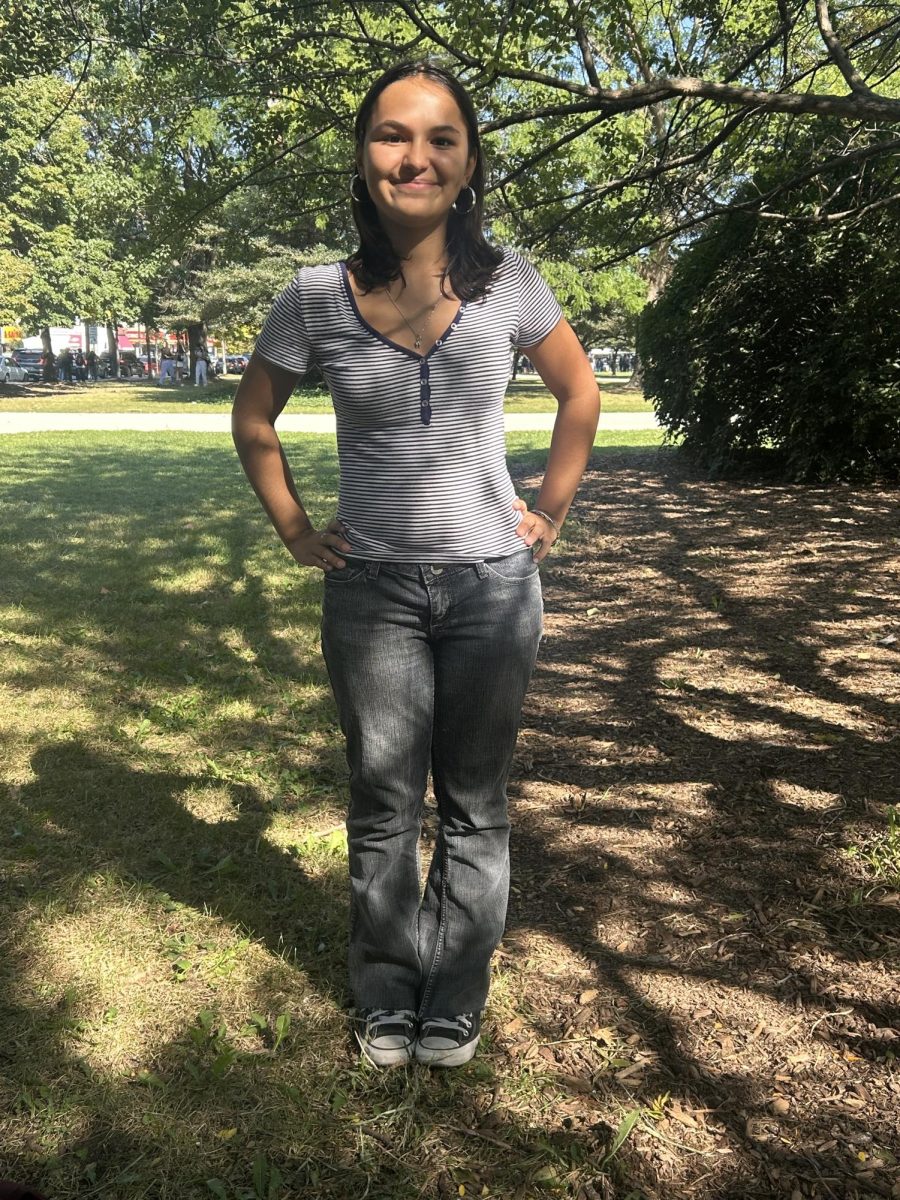By Walker Post
As I walked into Uncle Fun knowing it would be the last time I would step foot into the store, I could not help but feel as if Chicago was losing a very important part of itself. The visit brought back memories of a third grade birthday party, where everyone got goodie bags from Uncle Fun after time spent at Laser Tag. These bags were full of surprises: stink bombs, fake blood and Pez dispensers.
Uncle Fun closed down on Jan. 26 after Ted Frankel, the owner, decided to move to Baltimore to open an art store, Sideshow, which sells toys and Frankel’s original art. Uncle Fun has been around for 38 years and is widely known in Chicago for being the shop to visit for novelty items, gag gifts, and vintage toys.
Uncle Fun announced it would be closing in early January. Soon after, the store was flooded by customers looking to take advantage of the store’s 50 percent off sale. On Jan. 11, over a thousand customers came for their last chance to buy things like fake poop or pens that zap fingers. The checkout line stretched around the store.
“Not one person was angry or upset about waiting in a line,” Frankel said. “Everybody was sharing stories about [their time] at Uncle Fun.”
Jake Morris, Div. 463, went to the shop on Jan. 11, where he spent over an hour waiting in line. He browsed in the basement, which had never before been open to the public. He found a poster of icons from the 1960s including Jimi Hendrix and John F. Kennedy. While waiting in line, Morris chatted with other customers finding most everyone had positive things to say about the store.
Morris first visited Uncle Fun when he was eight years old. His dad developed a friendly relationship with Frankel because of his admiration for the store.
“The first time I went in, I was overwhelmed,” Morris said. “There’s nothing else like it.”
Uncle Fun is renowned for the nostalgic items customers stumble upon.
“I think that when people go to Uncle Fun, they get to be a kid again,” Morris said.
The sense of community was still apparent when I went to Uncle Fun on Jan. 13. It was more crowded than I had ever seen it, but most of the items I remembered buying there were gone. I watched as a man happily bought the last whoopie cushion and Groucho glasses. Frankel had just finished chatting with a customer, when I introduced myself.
We began discussing the history of the store, and it was clear Frankel was upset to be closing his “baby.”
“I’ve always been an old-fashioned retailer,” Frankel said. “I don’t pay attention to the money. I pay attention to my customers.”
Frankel remembers getting calls from principals who were not happy that he sold stink bombs at his store. He would always tell them that maybe the parents needed to be more vigilant and watch their kids.
Frankel has had his own problems with kids, catching them trying to steal things from his store. He tells these kids he would give them the items for free if they had just asked. It is obvious Frankel has a soft spot for young people.
“I love students,” Frankel said. “Everyone wants a fun uncle.”
Logan Bailey, Div. 473, found a gas mask at his first encounter with Uncle Fun. He sees Uncle Fun as a thrift store for toys and other nostalgic items.
“It’s sad that [Uncle Fun] is going away,” Bailey said. “…future generations will never have the experience of going into the store.”
Bailey recalls a dinner party his mom hosted where she and he scattered fake cockroaches and mice he had purchased at Uncle Fun around the food and on the floor. They watched in amusement as guests screamed in shock.
During my interview with Frankel, a man politely interrupted to thank him. He warmly wished Frankel good luck and told him that he remembered the Mr. T Tea Bags, which they both laughed about.
“My fondest memory is my customers of course,” Frankel said. “Without them I wouldn’t have been around for 38 years.”
A few minutes later, a music teacher approached Frankel and asked about buying a whole stack of books. Without hesitation, Frankel shot off the number $5 to her, which was clearly a bargain. The books were for her brother who was teaching an orchestra class.
Frankel recalls Pee-wee Herman coming into his store and the two of them sharing a laugh over Frankel’s collection of Pee-weiny Herman miniature harmonicas, which is where Herman adopted his name. Frankel excused himself from our conversation to go to the front of the store to retrieve one of these two-inch harmonicas. This made me realize that just about every toy in Uncle Fun had a great story behind it.
“My philosophy is when you see something great, you buy them all,” Frankel said.
The wall nearest the entrance was covered with signed photographs of athletes and newscasters who had written personal messages to Frankel.
Other celebrities who had visited the store included actor John Malkovich, singer Dolly Parton, and one especially notable performer.
“Ever heard of Michael Jackson?” Frankel asked.
He went on to describe a photo of the two of them sitting in a photo booth with Jackson on his lap. When I asked if I could see the picture he said it was buried away somewhere upstairs in his office.
When Frankel needed to get back to work, we shook hands and I thanked him for being so willing to talk.
As I continued wandering around the store, I found a few items that amused me. Over-exaggerated cartoon bookmarks of Prince Charles and Ronald Reagan, classic fake blood, and a Red Dog pin. I walked up to the register and pulled out my wallet, but the cashier had already bagged my items and told me I was all set. Confused, I started pulling out cash, but he assured me the stuff I was buying was not even worth a dollar.
For me and others, Uncle Fun’s legacy will be remembered as the generous toy store where one could go to find little reminders about the lighter side of life.





